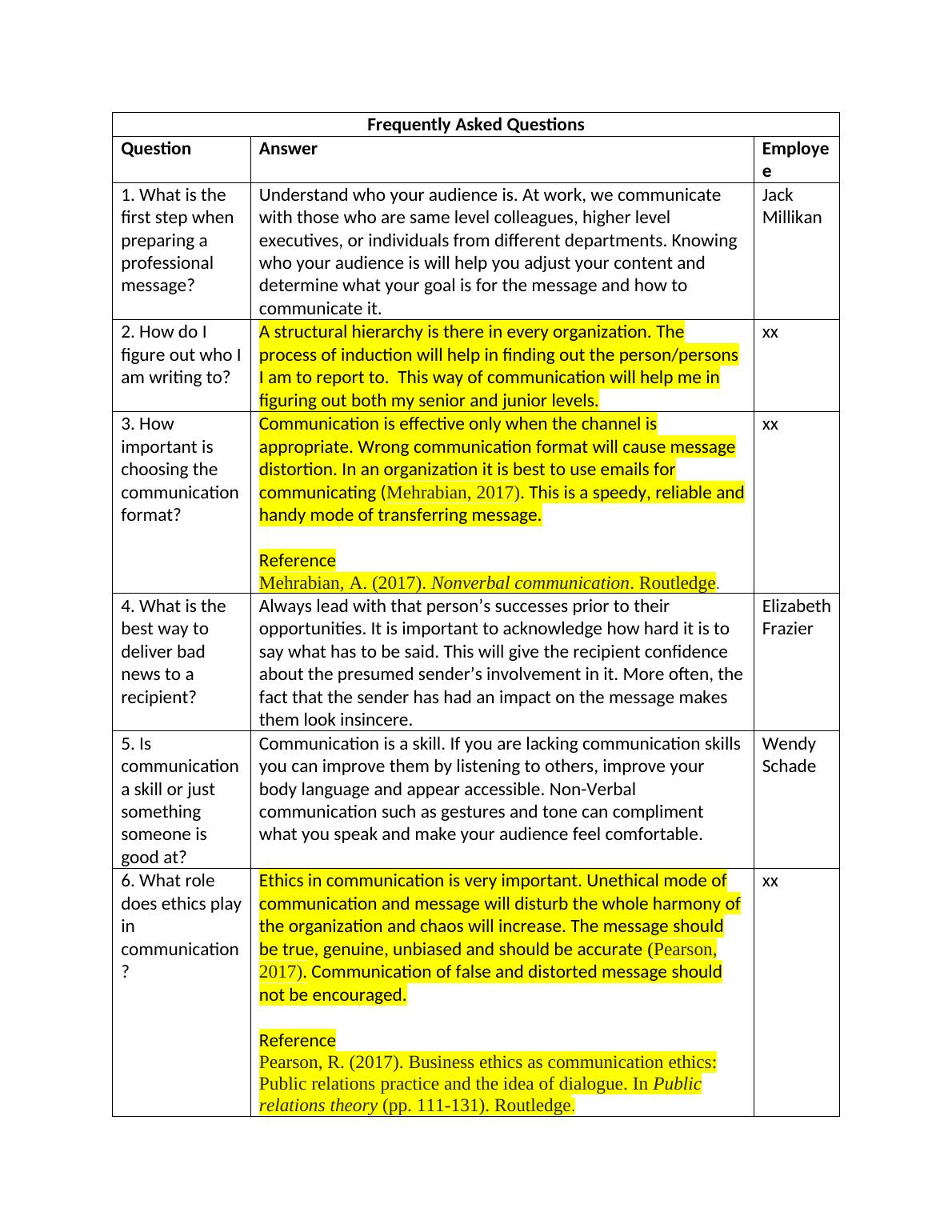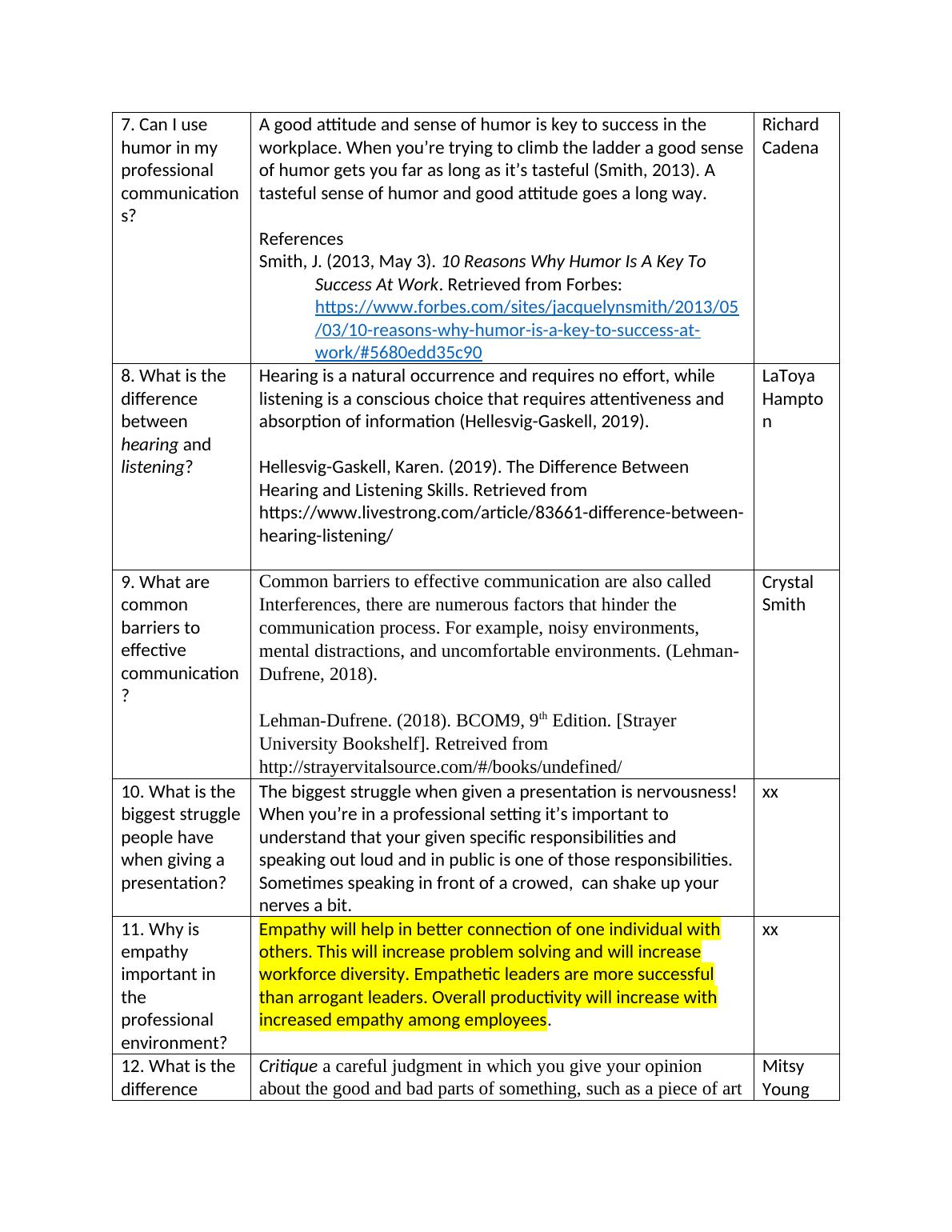Frequently Asked Questions on Professional Communication
5 Pages1778 Words255 Views
Added on 2023-04-23
About This Document
This document provides answers to frequently asked questions on professional communication. It covers topics such as audience analysis, communication channels, empathy, team building, body language, networking, and more.
Frequently Asked Questions on Professional Communication
Added on 2023-04-23
ShareRelated Documents
Frequently Asked Questions
Question Answer Employe
e
1. What is the
first step when
preparing a
professional
message?
Understand who your audience is. At work, we communicate
with those who are same level colleagues, higher level
executives, or individuals from different departments. Knowing
who your audience is will help you adjust your content and
determine what your goal is for the message and how to
communicate it.
Jack
Millikan
2. How do I
figure out who I
am writing to?
A structural hierarchy is there in every organization. The
process of induction will help in finding out the person/persons
I am to report to. This way of communication will help me in
figuring out both my senior and junior levels.
xx
3. How
important is
choosing the
communication
format?
Communication is effective only when the channel is
appropriate. Wrong communication format will cause message
distortion. In an organization it is best to use emails for
communicating (Mehrabian, 2017). This is a speedy, reliable and
handy mode of transferring message.
Reference
Mehrabian, A. (2017). Nonverbal communication. Routledge.
xx
4. What is the
best way to
deliver bad
news to a
recipient?
Always lead with that person’s successes prior to their
opportunities. It is important to acknowledge how hard it is to
say what has to be said. This will give the recipient confidence
about the presumed sender’s involvement in it. More often, the
fact that the sender has had an impact on the message makes
them look insincere.
Elizabeth
Frazier
5. Is
communication
a skill or just
something
someone is
good at?
Communication is a skill. If you are lacking communication skills
you can improve them by listening to others, improve your
body language and appear accessible. Non-Verbal
communication such as gestures and tone can compliment
what you speak and make your audience feel comfortable.
Wendy
Schade
6. What role
does ethics play
in
communication
?
Ethics in communication is very important. Unethical mode of
communication and message will disturb the whole harmony of
the organization and chaos will increase. The message should
be true, genuine, unbiased and should be accurate (Pearson,
2017). Communication of false and distorted message should
not be encouraged.
Reference
Pearson, R. (2017). Business ethics as communication ethics:
Public relations practice and the idea of dialogue. In Public
relations theory (pp. 111-131). Routledge.
xx
Question Answer Employe
e
1. What is the
first step when
preparing a
professional
message?
Understand who your audience is. At work, we communicate
with those who are same level colleagues, higher level
executives, or individuals from different departments. Knowing
who your audience is will help you adjust your content and
determine what your goal is for the message and how to
communicate it.
Jack
Millikan
2. How do I
figure out who I
am writing to?
A structural hierarchy is there in every organization. The
process of induction will help in finding out the person/persons
I am to report to. This way of communication will help me in
figuring out both my senior and junior levels.
xx
3. How
important is
choosing the
communication
format?
Communication is effective only when the channel is
appropriate. Wrong communication format will cause message
distortion. In an organization it is best to use emails for
communicating (Mehrabian, 2017). This is a speedy, reliable and
handy mode of transferring message.
Reference
Mehrabian, A. (2017). Nonverbal communication. Routledge.
xx
4. What is the
best way to
deliver bad
news to a
recipient?
Always lead with that person’s successes prior to their
opportunities. It is important to acknowledge how hard it is to
say what has to be said. This will give the recipient confidence
about the presumed sender’s involvement in it. More often, the
fact that the sender has had an impact on the message makes
them look insincere.
Elizabeth
Frazier
5. Is
communication
a skill or just
something
someone is
good at?
Communication is a skill. If you are lacking communication skills
you can improve them by listening to others, improve your
body language and appear accessible. Non-Verbal
communication such as gestures and tone can compliment
what you speak and make your audience feel comfortable.
Wendy
Schade
6. What role
does ethics play
in
communication
?
Ethics in communication is very important. Unethical mode of
communication and message will disturb the whole harmony of
the organization and chaos will increase. The message should
be true, genuine, unbiased and should be accurate (Pearson,
2017). Communication of false and distorted message should
not be encouraged.
Reference
Pearson, R. (2017). Business ethics as communication ethics:
Public relations practice and the idea of dialogue. In Public
relations theory (pp. 111-131). Routledge.
xx

7. Can I use
humor in my
professional
communication
s?
A good attitude and sense of humor is key to success in the
workplace. When you’re trying to climb the ladder a good sense
of humor gets you far as long as it’s tasteful (Smith, 2013). A
tasteful sense of humor and good attitude goes a long way.
References
Smith, J. (2013, May 3). 10 Reasons Why Humor Is A Key To
Success At Work. Retrieved from Forbes:
https://www.forbes.com/sites/jacquelynsmith/2013/05
/03/10-reasons-why-humor-is-a-key-to-success-at-
work/#5680edd35c90
Richard
Cadena
8. What is the
difference
between
hearing and
listening?
Hearing is a natural occurrence and requires no effort, while
listening is a conscious choice that requires attentiveness and
absorption of information (Hellesvig-Gaskell, 2019).
Hellesvig-Gaskell, Karen. (2019). The Difference Between
Hearing and Listening Skills. Retrieved from
https://www.livestrong.com/article/83661-difference-between-
hearing-listening/
LaToya
Hampto
n
9. What are
common
barriers to
effective
communication
?
Common barriers to effective communication are also called
Interferences, there are numerous factors that hinder the
communication process. For example, noisy environments,
mental distractions, and uncomfortable environments. (Lehman-
Dufrene, 2018).
Lehman-Dufrene. (2018). BCOM9, 9th Edition. [Strayer
University Bookshelf]. Retreived from
http://strayervitalsource.com/#/books/undefined/
Crystal
Smith
10. What is the
biggest struggle
people have
when giving a
presentation?
The biggest struggle when given a presentation is nervousness!
When you’re in a professional setting it’s important to
understand that your given specific responsibilities and
speaking out loud and in public is one of those responsibilities.
Sometimes speaking in front of a crowed, can shake up your
nerves a bit.
xx
11. Why is
empathy
important in
the
professional
environment?
Empathy will help in better connection of one individual with
others. This will increase problem solving and will increase
workforce diversity. Empathetic leaders are more successful
than arrogant leaders. Overall productivity will increase with
increased empathy among employees.
xx
12. What is the
difference
Critique a careful judgment in which you give your opinion
about the good and bad parts of something, such as a piece of art
Mitsy
Young
humor in my
professional
communication
s?
A good attitude and sense of humor is key to success in the
workplace. When you’re trying to climb the ladder a good sense
of humor gets you far as long as it’s tasteful (Smith, 2013). A
tasteful sense of humor and good attitude goes a long way.
References
Smith, J. (2013, May 3). 10 Reasons Why Humor Is A Key To
Success At Work. Retrieved from Forbes:
https://www.forbes.com/sites/jacquelynsmith/2013/05
/03/10-reasons-why-humor-is-a-key-to-success-at-
work/#5680edd35c90
Richard
Cadena
8. What is the
difference
between
hearing and
listening?
Hearing is a natural occurrence and requires no effort, while
listening is a conscious choice that requires attentiveness and
absorption of information (Hellesvig-Gaskell, 2019).
Hellesvig-Gaskell, Karen. (2019). The Difference Between
Hearing and Listening Skills. Retrieved from
https://www.livestrong.com/article/83661-difference-between-
hearing-listening/
LaToya
Hampto
n
9. What are
common
barriers to
effective
communication
?
Common barriers to effective communication are also called
Interferences, there are numerous factors that hinder the
communication process. For example, noisy environments,
mental distractions, and uncomfortable environments. (Lehman-
Dufrene, 2018).
Lehman-Dufrene. (2018). BCOM9, 9th Edition. [Strayer
University Bookshelf]. Retreived from
http://strayervitalsource.com/#/books/undefined/
Crystal
Smith
10. What is the
biggest struggle
people have
when giving a
presentation?
The biggest struggle when given a presentation is nervousness!
When you’re in a professional setting it’s important to
understand that your given specific responsibilities and
speaking out loud and in public is one of those responsibilities.
Sometimes speaking in front of a crowed, can shake up your
nerves a bit.
xx
11. Why is
empathy
important in
the
professional
environment?
Empathy will help in better connection of one individual with
others. This will increase problem solving and will increase
workforce diversity. Empathetic leaders are more successful
than arrogant leaders. Overall productivity will increase with
increased empathy among employees.
xx
12. What is the
difference
Critique a careful judgment in which you give your opinion
about the good and bad parts of something, such as a piece of art
Mitsy
Young

End of preview
Want to access all the pages? Upload your documents or become a member.
Related Documents
Analysis of Non-Verbal Communicationlg...
|6
|504
|346
Communication in Health: Importance and Skills Employedlg...
|7
|1479
|97
Employability and Enterprise skillslg...
|10
|2585
|334
